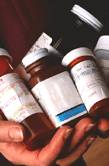
MONDAY, Nov. 16 (HealthDay News) — People taking the acid reflux drugs Prilosec or Protonix in combination with blood thinners such as Plavix have a higher risk for death after angioplasty than people who don’t take the two popular antacids, a new study has found.
The people in the study, which is to be presented Monday at the American Heart Association’s annual meeting in Orlando, Fla., were undergoing what doctors call “percutaneous coronary intervention,” or PCI, a common procedure used to widen a narrowed artery. PCI typically involves balloon angioplasty followed by the insertion of a drug-emitting stent, a tiny mesh tube, to keep the vessel open.
Study author Dr. Joseph Sweeny, an assistant professor of medicine at Mount Sinai Medical Center in New York City, said that the clinical implications for users of these reflux drugs — called proton pump inhibitors (PPIs)– remain unclear.
“It’s a moving target,” Sweeny said, adding that, “although certain confounders are going to be at play that do cause limitations of the study, in my opinion the data speaks for itself. We found an overall increased mortality in this patient population that takes a PPI with clopidogrel [Plavix]. The problem was I was not able to look at specific cause of mortality.”
One expert agreed that the study, while interesting, does not prove cause-and-effect.
“All this shows is that people taking PPIs have a worse outcome than those not taking PPIs,” said Dr. Chet Rihal, director of the Mayo Clinic’s catheterization lab in Rochester, Minn. “This does not prove there’s causation. That would be like saying that carrying matches is associated with lung cancer. It is associated, but it doesn’t mean it causes lung cancer.”
“These data do not show that patients should stop taking PPIS, and, in fact, it would be dangerous for patients to stop PPIs or other medication without a physician’s advice,” Rihal said.
The mortality increase shown by the study is not surprising, he added. “People who are older are the ones who get stents and tend to get ulcers and stomach problems [warranting use of PPIs] so we would expect them to have a worse prognosis,” Rihal said. “Whether it’s due to medical problems or whether it has something to do with a drug-drug reaction is unclear.”
PPIs are frequently given with aspirin and Plavix after an angioplasty procedure to reduce the chances of gastrointestinal bleeding. Many people also take PPIs for various gastrointestinal conditions, including acid reflux, gastric ulcers and stomach bleeding.
For the study, Sweeny and colleagues looked back at records of more than 8,300 people who underwent the procedure between April 2003 and June 2007. They were followed for an average of two years.
During the study period, 17 percent of them took a PPI. All of the patients also took both aspirin and Plavix, the researchers said.
Overall, people taking a PPI had a 30 percent higher risk for dying after their PCI procedure than did people who were not taking a PPI. Two drugs in the class appeared to contribute most of the added risk: Omeprazole (Prilosec) was associated with 72 percent higher risk for death after PCI, and pantoprazole (Protonix) was linked to a 54 percent increased risk, the study found.
Two other common PPIs — esomeprazole (Nexium) and lansoprazole (Prevacid) — did not show a heightened risk. There wasn’t enough data to rank a fifth drug, Aciphex (raberprazole), according to the study.
Sweeny could not say why Nexium and Prevacid were exempt from the effect. “It’s a very heterogenous interaction and depends on how a specific population metabolizes that drug,” he said.
People taking PPIs along with a blood thinner also had a small risk for developing blood clots after insertion of a stent, the team found.
The findings add to a lively back-and-forth about the dangers — or lack thereof — of combining antacids with blood thinners, with studies over the past few years coming down on both sides of the debate.
But according to Rihal, there may actually be an answer to this question, though not from the current study. He pointed to an earlier study that demonstrated an interaction between the two types of drugs, but only in a test tube.
When it came to replicating those findings in humans, however, no extra problems showed up in people taking PPIs compared with those not taking them. This was later confirmed by another study, Rihal said.
“That was actually the best-done study of them all,” he said.
One problem with the Mount Sinai study, Rihal said, is that it does not indicate why people were taking the antacids.
PPIs, used by millions of Americans, have also been linked to a number of other health risks, including an increase in hip fractures, diarrhea and community-acquired pneumonia.
Former American Heart Association (AHA) president and current spokesman Dr. Sidney Smith said that new AHA/American College of Cardiology recommendations regarding PPIs would be announced Wednesday at the Orlando conference.
More information
The American Heart Association has more on angioplasty and stenting.

